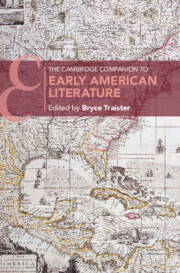Book contents
- The Cambridge Companion to Early American Literature
- The Cambridge Companion to Early American Literature
- Copyright page
- Contents
- Figures
- Contributors
- Introduction
- Part I How to Read (in) Early America
- Part II Readings in Early America
- 7 Accident, Disaster, and Trauma
- 8 Settler Kitsch
- 9 Like a Prayer
- 10 Varieties of Bondage in the Early Atlantic
- 11 The Erotics of Early America
- Part III Early American Places
- Select Bibliography
- Index
- Cambridge Companions To …
9 - Like a Prayer
The Anti-Slavery Petition in the Era of Revolution
from Part II - Readings in Early America
Published online by Cambridge University Press: 18 November 2021
- The Cambridge Companion to Early American Literature
- The Cambridge Companion to Early American Literature
- Copyright page
- Contents
- Figures
- Contributors
- Introduction
- Part I How to Read (in) Early America
- Part II Readings in Early America
- 7 Accident, Disaster, and Trauma
- 8 Settler Kitsch
- 9 Like a Prayer
- 10 Varieties of Bondage in the Early Atlantic
- 11 The Erotics of Early America
- Part III Early American Places
- Select Bibliography
- Index
- Cambridge Companions To …
Summary
How might a close reading of the language of revolutionary-era anti-slavery petitions contribute to a broader understanding of the politics of the American founding? This chapter focuses on one of the earliest surviving examples of African American political writing, the petition submitted to the Massachusetts House of Representatives in January 1773, by an author named FELIX. Revolutionary republicans came to disparage the petitionary form, because it had failed to persuade King George to defend his colonial subjects. The petition’s conventional language of deference and its tendency to “pray” or plead rather than to demand or insist led many colonists to reject the form in favor of far more assertive declarations of individual and collective right. By reanimating the petition, however, African Americans like FELIX not only contributed to the work of anti-slavery agitation; they also, as this chapter suggests, registered resistance to some of the dominant political ideas of the republican revolution. Drawing on historical studies of the significance of the petition in the colonies as well as accounts of the petition’s key formal and rhetorical features, this chapter makes the case for a specifically African American contribution to the political discourse of the founding.
Keywords
- Type
- Chapter
- Information
- The Cambridge Companion to Early American Literature , pp. 148 - 162Publisher: Cambridge University PressPrint publication year: 2021

